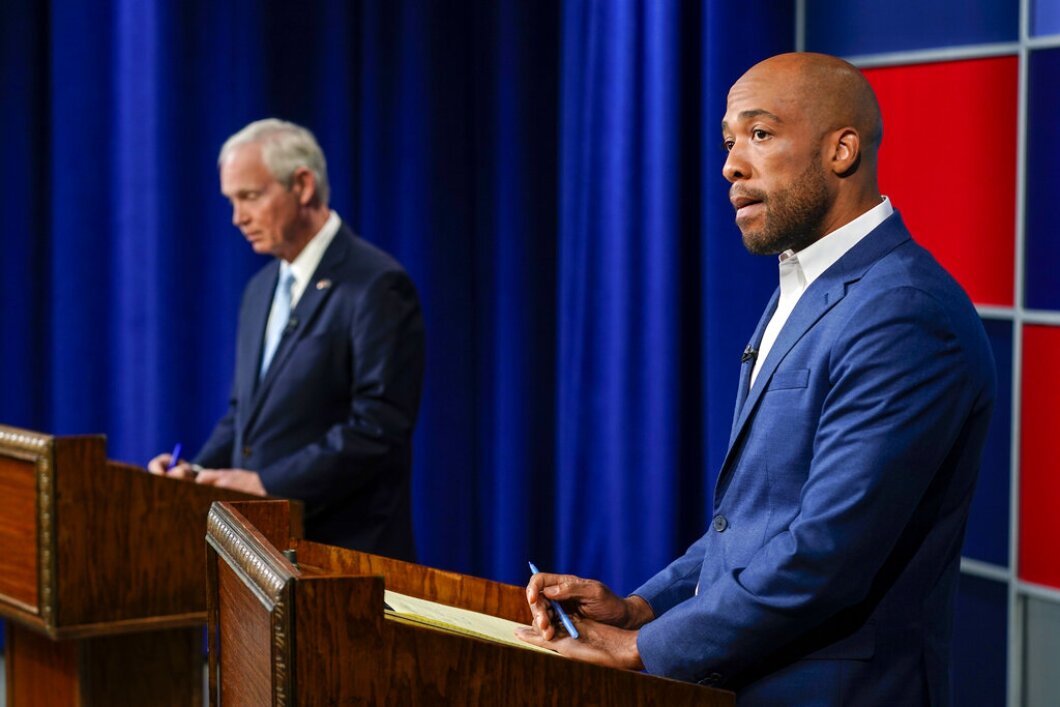
MILWAUKEE — Lt. Gov. Mandela Barnes opened his debate with Sen. Ron Johnson (R-WI) intent on dispelling his image as a soft-on-crime Democrat, an indictment by Republicans that was bolstered by his own words, making him the underdog in the Wisconsin Senate race.
Early in his televised faceoff with Johnson, Barnes used a question to the candidates about “bail reform” related to last November’s Christmas parade killings in Waukesha, Wisconsin, to declare his position on the “sensationalized” and “mischaracterized” issue — even before the senator could go on the attack. “I really appreciate this question,” the lieutenant governor declared, moving proactively to recast the narrative surrounding his opposition to cash bail requirements for alleged criminals.
“I have supported bail reform,” Barnes conceded before claiming Republicans are using the Waukesha tragedy for political gain. But the lieutenant governor’s follow-up to those remarks was telling. Rather than presenting an egalitarian approach to addressing mass incarceration or racial disparities in sentencing, Barnes said his goal was to keep alleged lawbreakers behind bars and crack down on rising crime.
“Under my plan, the [Waukesha] perpetrator wouldn’t be able to get out [of prison] if he paid $1,000 or $100,000,” Barnes said. “This is about keeping people safe by making sure that those likely to offend and cause harm do not get to buy their way out of jail. That’s the system we have now; and this sort of reform, that I support, has been supported by Republicans all across the country as well.”
Johnson did not let Barnes’s attempted makeover go unanswered.

“We have a huge problem [with] skyrocketing crime. One of the issues is we’re not keeping criminals in jail, and the lieutenant governor, when he was in the legislature, wrote the bill to eliminate cash bail. That was one of the methods — one of the methods — we can use to make sure that dangerous criminals stay in jail,” the senator said. Then he snuck in a second dig at Barnes.
“If you want to reduce crime, first of all, you have to fully fund the police,” Johnson said. “And, of course, my opponent is opposed to fully funded police budgets.” Barnes was none too pleased, quickly moving to rebut the senator before being cut off by the debate moderator.
FETTERMAN TO RALLY IN KEY ‘PURPLE’ PENNSYLVANIA COUNTY FOR FIRST TIME
Barnes is on shaky ground with little more than a month to go before Election Day despite a monster third-quarter fundraising haul of $20 million.
Since grabbing a lead over Johnson in the polls in late summer as Democrats surged into contention in the midterm elections, Barnes has dropped. The senator has topped the lieutenant governor in six of the last seven polls, building an average lead of 49.3% to 46.6% dating to mid-September. Voters are dissatisfied with President Joe Biden and preoccupied with high inflation and, in Wisconsin, especially rising crime. This dynamic has created challenges for Barnes.
The 35-year-old liberal former state legislator, likable and engaging, is an expert at outflanking Democrats on the left in primaries. But he has never had to appeal to independents and soft partisans, on his own, in a general election — statewide or otherwise. When Barnes was elected lieutenant governor in 2018, he ran as the No. 2 on the ticket headlined by now-Gov. Tony Evers (D). None of this is discouraging Barnes’s supporters.
“It’s closer than it should be. But I get the sense that ultimately, with voter turnout, I think he will pull it out,” said James Mousigian, 62, a traveling charcuterie salesman who on Friday evening attended a modest rally for Barnes and waved one of the lieutenant governor’s campaign signs in downtown Milwaukee, outside of the PBS affiliate hosting the debate.
The party in power in the White House typically loses an average of 25 House seats and four Senate seats in midterm elections. But Mousigian believes “a lot of those old tropes,” in this case about Democrats, “don’t apply to this election.” That he is an enthusiastic voter is not insignificant to Barnes’s prospects. The president’s party often falters in midterm contests because its voters are less motivated.
Johnson, 67, has some roadblocks of his own to navigate: the elimination of federal protections for abortion rights brought about by the Supreme Court’s Dobbs v. Jackson Women’s Health Organization ruling — and lingering concerns about his habit of downplaying the Jan. 6, 2021, riot at the U.S. Capitol. Still, Barnes is going to have to overcome steep hurdles to upset the senator, an experienced campaigner with two statewide victories under his belt.
Perhaps the lieutenant governor’s biggest obstacles are his past rhetoric and record in the Wisconsin Legislature. Barnes is an outspoken critic of “mass incarceration.” His signature issue is bail reform — making it easier for suspected criminals to avoid jail time pretrial. That’s a problematic resume at a time when Milwaukee is enduring a crime wave and many Badger State voters remain rattled by the 2020 Kenosha riots and 2021 Waukesha Christmas parade massacre.
Barnes’s otherwise workmanlike debate performance and comments from his campaign spokeswoman after his duel with Johnson suggest he recognizes as much.
After the debate, Barnes campaign spokeswoman Maddy McDaniel was asked if Barnes’s position on law enforcement, and claims by opponents he supports “defunding” the police, have caused political problems. She used the question as an opportunity to push back on the “defund the police” criticism by highlighting this comment from Johnson during the debate.
Barnes, the senator said, “has a record of wanting to defund the police — and I know he doesn’t necessarily say that word. But he has a long history of being supported by people that are leading the effort to defund. He uses code words … like ‘reallocating.’” Here’s how McDaniel characterized this statement: “You even heard Sen. Johnson tonight say that Mandela Barnes does not support defunding the police. He has been clear in that position.”
CLICK HERE TO READ MORE FROM THE WASHINGTON EXAMINER
McDaniel went on to say, definitively, that Barnes “does not support defunding the police,” touting his collaboration with Evers to appropriate more state money for “violence prevention.” But when asked, specifically, whether Barnes supports more or less funding, higher or lower staffing, for police departments — and later pressed again on these questions, McDaniel sidestepped, creating fodder for more attacks from Republicans and possibly more doubts from unsure voters.
“He has been clear about his holistic view to crime prevention,” she said. “He’s always said we need to have equal spending in the things that prevent crime as well as law enforcement. But he also believes we need to be investing in education, in good schools, good jobs, things that Sen. Johnson has refused to support.”





